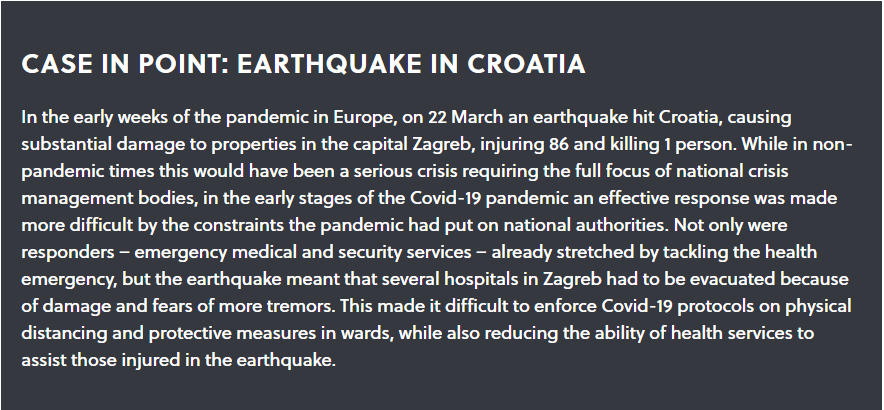Disaster risks during Covid-19
The capacities of countries globally to tackle pandemics have markedly improved over the past year. While in the initial months some countries were slow to respond to the fast-spreading virus, by the end of 2020 almost every government across the globe had adopted a set of measures and policies that growing scientific evidence suggested were effective in slowing the virus from spreading. Indeed, best practices from countries that responded early and effectively – and recorded lower number of cases and deaths – were quickly adopted by others. Governments learned lessons quickly and acted swiftly, introducing lockdowns, social distancing and face covering rules in a bid to reduce the health and economic impacts of the pandemic.
However, these lessons came at a considerable cost, both human and economic. Public finances and human capital are increasingly under strain as governments continue the battle against the pandemic. This is particularly visible in areas such as Europe and North America where a “second wave” of infections has led to a repeat of stricter restrictions on economic activity and movement.
NATURAL AND HEALTH EMERGENCY
Against this context, many governments are struggling to effectively respond to natural disasters. With the current strain on resources, infrastructure and supply chains, the ability to successfully deal with a natural disaster is likely to be substantially reduced in many areas across the globe. In particular, the following factors are likely to underline the declining ability to manage natural disasters and their impact:
- AVAILABILITY OF RESPONDERS – Emergency services are stretched and struggling for resources even in some of the wealthiest economies across the globe. In the case of natural disaster, governments are very likely to struggle to allocate the necessary financial and human resources to efficiently tackle the crisis.
- STRAIN ON HEALTH SYSTEMS – In dealing with the Covid-19 pandemic health systems have come under unprecedented strain. Therefore, most countries would struggle to effectively respond to a major natural disaster while focusing on responding to the pandemic.
- SUPPLY CHAIN DISRUPTIONS – The Covid-19 pandemic revealed the dependence on most economies globally on an increasingly complex supply chain. As governments imposed restrictions on movement and economic activity, many had difficulties in procuring essential personal protective equipment (PPE) for health workers and other key roles across the economy. Continued supply chain disruptions are likely to exacerbate the impact of natural disasters, when large quantities of PPE or essential supplies might need to be imported on very short notice.
- MOVEMENT RESTRICTIONS – Maintaining physical and social distance required for reducing the spread of Covid-19 is likely to be very difficult during and after natural disasters, as a result of population displacement, property damage and reduced availability of essential supplies and utilities.
Businesses and individuals are likely to witness longer-lasting and more adverse impacts of natural disasters.
IMPLICATIONS
As a result, businesses and individuals are likely to witness longer-lasting and more adverse impacts of natural disasters. Even in countries that historically topped the disaster preparedness charts, such as Japan and South Korea in Asia, or France and Germany in Europe, there will be significant obstacles to tackling natural disasters. The effects are likely to be particularly harsh when:
- DEALING WITH DIFFICULT TO PREDICT HAZARDS – Since preparedness is key to effective response, when natural disasters are difficult to predict response will be weaker. For example, while flooding/monsoon or hurricane seasons tend to take place at predictable intervals, earthquakes and volcano eruptions are much more difficult to predict. As a result, local and national authorities are less likely to be prepared for their occurrence and plan additional capacities to quickly respond to such disasters.
- LARGE POPULATIONS ARE DISPLACED – Severe disasters affecting large geographical areas are more likely to lead to displacements of large populations. Such events are likely to be more difficult to contain and under the current circumstances are likely to require significant additional effort to ensure the health and safety of those displaced as a result.

IMPACT ON TRAVELLERS
With international travel continuing to suffer from Covid-related movement restrictions, governments’ reduced capacity to tackle natural disasters will only worsen the conditions for travellers. Even for seasoned travellers, who have often travelled to areas prone to natural disasters, the current context is likely to be challenging. Taking appropriate steps to ensure travel is safe and secure is more important in 2021 than it has been over the past couple of decades. To minimise to your personnel and business, we recommend the following measures:
- ENSURE TRAVEL POLICIES AND RISK ASSESSMENTS REFLECT MULTIPLE RISKS AND HAZARDS – Flexible policies that cover hazards and disasters can be adapted to specific incidents, whether industrial disasters or natural hazards, and provide a single point of reference for travellers and corporate headquarters.
- UNDERSTAND AND PREPARE FOR THE LOCAL CONTEXT – Understanding the local context is always critical, but with the fast-changing dynamics of the Covid-19 pandemic government rules and regulations can change with no notice. Being up to date with local developments and requirement will remain crucial in coming months.
- HAVE ALTERNATIVES – The key lesson that businesses and individuals learned in 2020 is to have options prepared; alternative plans will remain essential as global uncertainty extends into 2021. Whether back-up travel routes or modes of travel, or means of communications with travelling personnel, having several available alternatives will limit the adverse consequences if natural or other disaster disrupts initial plans.
